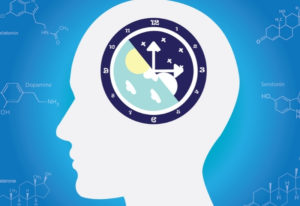Over the years, through a variety of experiments and studies, scientists have discovered unique relationships between certain medical conditions and the body’s 24-hour internal clock. The circadian rhythm influences a variety of health functions and even influences the risk of health issues, such as autoimmune diseases. Research examining the circadian rhythm and autoimmune disease suggests that the regularity of your sleep patterns can actually play an important role in the development or suppression of specific autoimmune disorders.
Here is what you need to know about how the circadian rhythm relates to autoimmune disorders and what you can do to support healthy sleep function.
What is the Circadian Rhythm?

A variety of environmental factors influence the circadian rhythm, cycling through every 24 hours. The most influential factor in this cycle is daylight. As the day dawns, the body’s master clock sends biochemical signals that keep you functioning at attentive levels. Conversely, the body begins to wind down and prepare for sleep by producing the sleep-inducing hormone known as melatonin as darkness creeps in. The production of melatonin and the slowing of the cycle of alertness encourages optimal levels of sleep.
What Happens if Your Circadian Rhythm is Disrupted?
Without a properly functioning circadian rhythm, optimal physical and mental health can both be at risk. Those who experience a disrupted internal clock often come down with chronic and systemic inflammation that then contributes to a variety of serious health issues. Some of the most common health problems that are exacerbated by inflammation include cancer, digestive issues, mental health struggles, autoimmune diseases, obesity and hypertension.
Because of this, medical professionals usually prescribe maintaining a healthy sleep pattern as part of a comprehensive health program. This is particularly important for individuals who are diagnosed with chronic disease. Along with a proper diet and a regular exercise routine, healthy sleep patterns form a cornerstone of good health.
What Are Autoimmune Diseases?
Some of the most common health issues associated with circadian rhythm disruption are autoimmune disorders. These diseases are the result of an immune system that mistakenly attacks the body’s own tissues. When this happens, the immune system releases autoantibodies that attack healthy cells, leading to a myriad of symptoms and disorders.
While some autoimmune diseases target just one organ, others affect the entire body. A few of the most well-known autoimmune diseases include type 1 diabetes, lupus, multiple sclerosis, inflammatory bowel disease, celiac disease and rheumatoid arthritis.
The Connection Between the Circadian Rhythm and Autoimmune Disease
Researchers at the Trinity College Dublin used mice to prescribe maintaining a healthy sleep pattern as part of a comprehensive health program. The experiment showed that the master circadian gene BMAL1 is responsible for sensing and then acting on time cues in an effort to reduce inflammation in the body.
In the study, it was found that the loss of this master gene was found to induce a much more severe autoimmune response during flareups that occurred in the middle of the day as opposed to those that occurred at midnight.
Continuing research has supported the link between the circadian clock and the immune system. For example, a disrupted circadian rhythm in a patient with multiple sclerosis is more likely to cause an increased prevalence of disease that can be attributed to issues in the master circadian gene BMAL1.
What Can You Do to Protect Your Circadian Rhythm?
This research corroborates the fact that it is important to do what you can to support a normally functioning circadian rhythm cycle. This is particularly important if you suffer from an autoimmune disease or if you are at risk for developing one. So what can you do to maintain a healthy circadian rhythm function?
Maintain a Regular Daily Schedule
In addition to going to sleep at a regular time, it is also important to strive to stick to a set schedule with your eating and activity patterns.
Bright Light Therapy

Get Up and Move It
Regular exercise may also be instrumental in helping to regulate your sleep and wake cycles. Be careful not to exercise too closely to bedtime, as that may disrupt your sleep patterns.
Avoid Blue Light
You should also avoid using light-emitting electronic devices, such as smartphones and tablets, for at least one hour prior to crawling into bed. A dim sleeping environment also helps to stimulate the body’s production of melatonin.
The more that scientists discover about the body’s circadian rhythm, the more that it becomes obvious that this internal clock is essential to overall health. Improving your sleep cycles could be the key to keeping autoimmune diseases at bay for some individuals, making it important to encourage optional circadian rhythm function.







